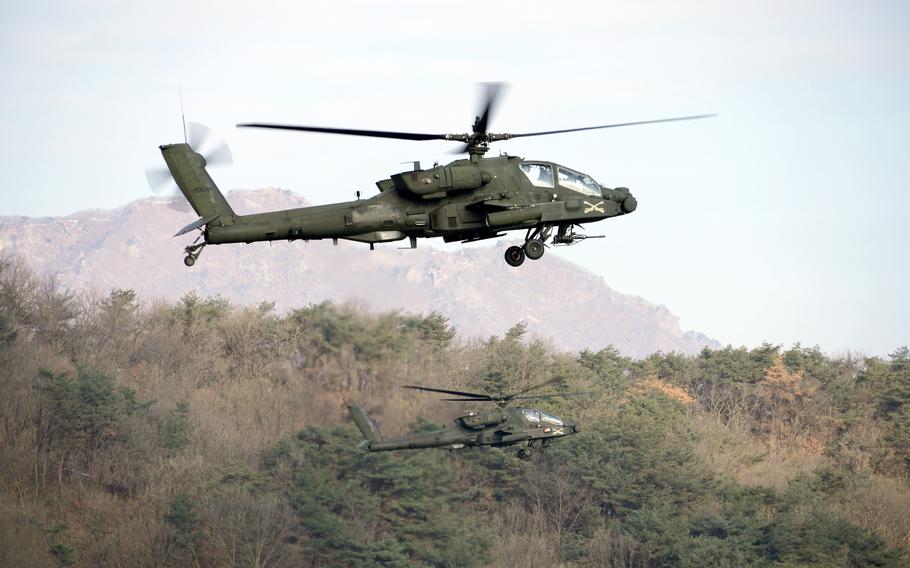
U.S. Army AH-64 Apaches hover over the Rodriguez Live Fire Complex in Pocheon, South Korea, Feb. 10, 2025. (David Choi/Stars and Stripes)
POCHEON, South Korea — Machine gun and artillery fire echoed through a barren valley Monday as U.S. and South Korean troops trained together in freezing temperatures, just 16 miles from the border with North Korea.
AH-64 Apache helicopters from the U.S. Army flew over the Rodriguez Live Fire Complex as American M-777 howitzers and South Korean K-1 tanks pounded distant targets. The 21-day exercise, which kicked off Feb. 4, aims to enhance combat coordination between the allies.
“We learn from them just as much as they learn from us,” Capt. Zach Douglas, training officer for the 1-2 Stryker Brigade Combat Team, told reporters at the range. “It’s been great being able to establish those relationships with units that we’ve never worked with before.”
The Stryker brigade, based at Joint Base Lewis-McChord, Wash., took over rotational duties in South Korea on Oct. 25. Since 2015, the U.S. has deployed brigades of approximately 3,500 soldiers to South Korea on nine-month rotations.
Roughly 300 U.S. and South Korean troops participated in Monday’s drills. As K-1 tanks fired on targets, Apache helicopters overhead engaged with 30mm guns. In the distance, American howitzers sent shockwaves through the valley as they struck a hillside target.
Air Force A-10 Thunderbolt II attack aircraft are also scheduled to join the exercise, said 2nd Infantry Division spokeswoman Maj. Mayra Nanez.
The drills test how light infantry units can use different “avenues of approach” to strike multiple objectives simultaneously, Douglas said.
For example, on Monday, South Korean tanks simulated an attack across open ground while U.S. and South Korean ground troops engaged an enemy position that was inaccessible to tracked vehicles.
The exercise represents the culmination of months of joint training, Spc. Israel Urrea, a 1-2 infantryman, told reporters.
“Whenever we get a [South Korean] squad attached to us and we go to our mission, wherever that may be, and seeing all of our pieces going into effect, it’s like a chess game,” he said. “Having to do the mission together as a platoon, honestly, I don’t even think of them as an attachment, I just think that they’re part of the platoon when they’re with us.”
North Korea routinely denounces U.S.-South Korean military exercises, calling them rehearsals for an invasion.
On Sunday, the state-run Korean Central News Agency criticized the latest drills, saying they were “escalating the regional tension.”
“Hostile and risky acts will only entail undesirable consequences,” the report said.